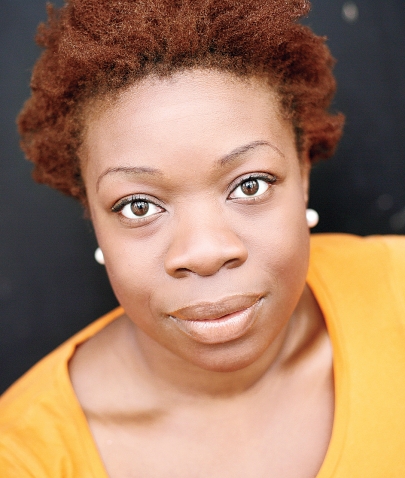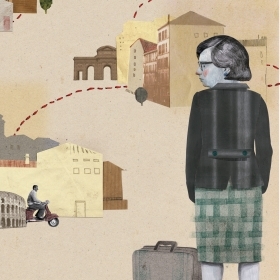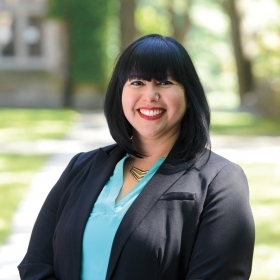After graduating from San Francisco’s American Conservatory Theatre in 2009, Mfoniso Udofia ’06 moved to New York City, secured an agent, and began auditioning for plays and films. It was the stuff her burgeoning dreams were made of—except she couldn’t get a part. Slowly, she began to realize what no one else would say out loud: She wasn’t “the right type” of black. “You walk into stories you think you know and have occupied, and realize the room says you don’t know them,” she explains. Mfoniso eventually booked roles in a play and an independent film, but her agent eventually dropped her, saying, “You are really talented, but we don’t know what to do with you right now.” After the independent film wrapped, something more important happened: She began writing her own roles.
The first play she wrote was one she’d begun at A.C.T., called The Grove, about Adiagha Ufot, the eldest daughter and first-generation of a Nigerian family living in America—a story similar to Mfoniso’s own. Mfoniso’s parents moved to the States from Nigeria, her mother a neurobiologist and her father a professor of Africana studies. They had high academic aspirations for their children. Mfoniso remembers reading Dr. Seuss as a child and her father sliding Alice Walker’s Meridian across the table and asking, “What do you think the thesis of this is?”
She studied political science at Wellesley and planned to apply to law school, but then, as a junior, she read Ntozake Shange’s 1975 play For Colored Girls Who Have Considered Suicide / When the Rainbow Is Enuf. “I knew then, this is my life, this is what I want to do,” she says. She became the black arts chair of Ethos and put on a full production of Shange’s play, and a few others, not yet understanding that it was the storytelling component she loved most.
After she finished The Grove in 2011, she realized she’d lost the desire to act, and that she had more to tell. She has since written dozens of plays, all of them about Nigerian characters. As Mfoniso kept writing—and being awarded prestigious residencies to facilitate that process—one of her primary goals became locating Africans in America with authenticity and honesty. “I wanted to disrupt a little bit of the fabric of the American theater,” she explains. She was tired of Africa being dealt with as a faraway thing to be gazed at, as if it were a specimen in a Petri dish.
But also, she says: “I am wrestling—no, dancing—with my own culture,” and it’s the questions that drive her forward. As a first-generation Nigerian in America, how does one hold two cultures and love them? Can Nigeria and America coexist? And what is the nature of love within that? “I don’t know that you’ll look at my plays and ever get an answer to a thing,” she adds. “I don’t have them. The goal is not actually to get to an answer, but the asking is important.”
Sojourners, one of Mfoniso’s plays, will receive its world premiere off-Broadway, produced by Playwrights Realm in the winter of 2016, and its West Coast premiere in the spring of 2016 at the Magic Theatre in San Francisco. Her work has been developed and presented by Playwrights Realm, National Black Theater, Sundance Theatre Lab—to name a few—and she’s been a finalist for dozens of prizes. Still, she seems a bit stunned by her own success. None of this, she says, is something that was given to her. “Wellesley was where I discovered I had a life to get,” she says. “I was looking and sometimes tasting, but not really grabbing. I want to say I’m probably starting to grab now.”







We ask that those who engage in Wellesley magazine's online community act with honesty, integrity, and respect. (Remember the honor code, alums?) We reserve the right to remove comments by impersonators or comments that are not civil and relevant to the subject at hand. By posting here, you are permitting Wellesley magazine to edit and republish your comment in all media. Please remember that all posts are public.